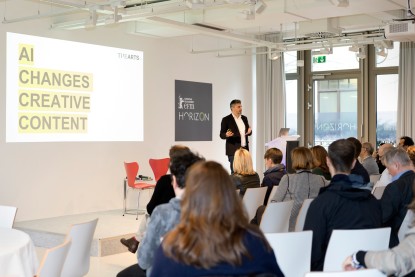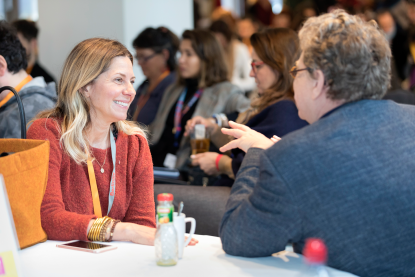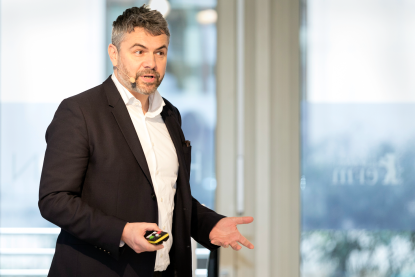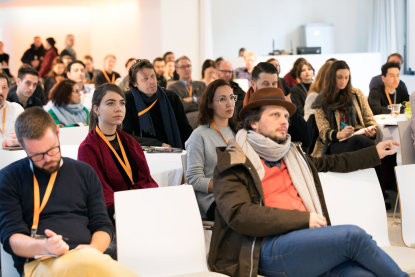AI: Film's New Normal?
Pragmatic AI for the Entire Production Cycle
Tuesday, 25 February 2020, 11.30 am - 1.30 pm
Please note that the information currently given below refers to EFM Horizon 2020 and is shown in order to offer a general insight. All relevant content will be updated as soon as it becomes available.
Contact
EFM Horizon
Berliner Freiheit, 10785 Berlin

Artificial intelligence is becoming part of everyday reality for professionals working across the entire film ecosystem. From idea generation and scriptwriting, to shooting and post-production, and all the way through to distribution and marketing, AI is enabling new levels of efficiency, profitability, strategic decision-making and perhaps even creativity. This AI session will take a deep dive into the evolving capacities of this technology, with a pragmatic focus on the factors that matter most for film and entertainment business.
Moderated by AC Coppens (The Creatives' Catalysts)
Introduction Keynote by Maja Cappello
Let us start with unfolding some of the fascinating questions surrounding legal, philosophical and ethical issues. Can a machine be a copyright holder? Or can a person or a company be the copyright holder of a work created by a machine? As AI systems operate by learning from other pre-existing works, should this be considered as a copyright infringement of these works? When will CGI actors replace human ones? Which personality rights issues do emerge with deep fakes? And what about the usage of algorithms for search? Maja closes the gaps between AI, algorithms and copyrights, image rights and cultural diversity.
Maja Cappello is Head of the European Audiovisual Observatory’s legal department, a Strasbourg-based public service body, part of the Council of Europe, active in reporting on the media sector at large (cinema, copyright, audiovisual). A workshop organised by Maja’s team last December gathered 30 experts from all over Europe to explore the impact of AI on production and distribution of news and fiction. A report is soon to be published. Before joining the Observatory in 2014, Maja worked 16 years for the Italian media regulator, where she was amongst others in charge of copyright issues. She is Italian-Norwegian national, lawyer and philharmonic choir singer, and holds a PhD and a master in international and EU law.
In this presentation by Monica Landers, we'll learn real-world applications for AI in story development. What does it look like to benchmark your film or episodic to relevant story development? How can you use sophisticated datasets to make smarter IP decisions? This talk will answer these questions by explaining real-world examples of working with a range of data sets from kids television to Oscar winners. We’ll also get a reality check of what AI can and can't do today for storytellers.
Monica Landers is founder and CEO of StoryFit, a rapid-growth technology company which provides AI analytics for the publishing and entertainment industry. With two media technology patents, Monica’s deep experience in media extends from producing for ABC News and Good Morning America to executive leadership at multiple content companies, including VP Media Innovation at Demand Media. Monica has deep roots in Austin's startup community and is an advisor to Techstars and Comcast accelerators, University of Texas and Texas State universities, and organizations such as SXSW and Women@Austin.
Last year, AI-powered box office predictions were the subject of much industry speculation. This year, they hit the mainstream, as Warner Bros. announced a partnership with AI decision-making startup Cinelytic. In this presentation, Cinelytic CEO Tobias Queisser will separate fact from fiction when it comes to what AI-powered insights offer the entertainment industry. With real-time demos in Cinelytic’s online platform, we’ll learn how AI can give the entertainment industry the strategic risk-taking, analytical edge and decision-making speed of the finance and tech sectors, and what this means for different stages of the content value chain, across packaging, financing, producing, distributing and marketing.
Tobias Queisser is Co-Founder and CEO of Cinelytic, machine-learning driven SaaS platform that enables entertainment industry professionals to make faster and better-informed decisions. Tobias is also the founder of Arctic Pictures Limited, an international film production company based in London focusing on sourcing, development, financing and production, and a former investment banker, having spent 10 years in the finance industry before co-founding a global investment fund. In addition to holding an MSc in International Accounting & Finance from CASS Business School London, Tobias studied Film Finance & Production at UCLA Los Angeles, as well as Film Production & Production Management at the National Film and Television School London.
From Google Translate to Alexa, natural language processing is one of AI’s most familiar faces as a consumer technology. Inside the media and entertainment industry, NLP is something of an unsung hero, removing the tedious from a post-production task critical for making content accessible: subtitling. In this presentation, VP of AI and Engineering Roderick Hodgson will explain how Simon Says makes NLP work for video professionals, offering with accurate, fast transcription with speech-to-text, speaker identification, and auto-punctuation all in 100 languages. Roderick will also share what’s on the horizon for NLP in film, from using AI transcriptions identify meaningful sections of rushes, to using computer vision to augment knowledge gathered from the transcription, towards Simon Says’ ultimate goal of automating an entire first draft rough cut with minimal input from the film director.
For entertainment giants like Netflix and Amazon, data analysis is everything, guiding strategy and driving success. But what about for smaller players in the film eco-system? Data-based insights can be just as vital, especially when it comes to making smart decisions for distribution and marketing to make the most of a shoestring budget. Here’s where AI can step in and help. In this presentation, Jess Fuselier, Sundance Institute’s expert for creative distribution will share how independent filmmakers can use accessible, budget-friendly digital tools for strategic, financial and creative decisions backed by AI and data-based insights.
Jess Fuselier is a community outreach, marketing and data specialist at the Sundance Institute, living in Los Angeles, California. The Creative Distribution Initiative helps independent storytellers build audiences and sustain careers through innovations in marketing, distribution, and data transparency. As manager of research and education for the Creative Distribution Initiative, Jess is working to cultivate meaningful insights rooted in data transparency, in order to create resources that impact the sustainability of the independent film community at large.



